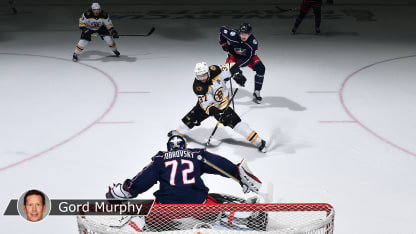Columbus had its chances shorthanded; center Boone Jenner had about four, along with a shorthanded penalty shot attempt that was saved by Rask. They're still killing well in that sense, but Boston twice found a way to get the puck to Bergeron, once on the rush and once in a set-up off a rebound.
He has to feel better about himself now. Same for Marchand and Pastrnak. It'll be a tougher job for the Blue Jackets to try to keep them contained again, but they can do it. We've seen it.
Columbus should maintain its confidence against the Bergeron line going into Game 5 because of how well it has played against that line in 5-on-5 situations, by doing an outstanding job with their five-man gap in the defensive zone.
The Blue Jackets forwards are pressuring hard and as soon as Bergeron, Marchand and Pastrnak enter the zone and look to do anything east-west or try to cut inside, the back pressure is there swallowing them up with the tight gap of defensemen Zach Werenski and Seth Jones.
Werenski and Jones have such good mobility and range that they're not intimidated by the skill and speed of Boston's top line. That gap just tightens like a vise on the Bruins' top line, which has been unable to make its plays in front of the defensemen or behind the forwards.
Flip it around, though, and Boston is doing a terrific job defensively against Columbus' best players in 5-on-5 situations too. They're just doing it differently.
The Bruins are trying to manage the puck and not turn the puck over coming up the ice because they know the Blue Jackets are one of the better teams at turning good defense into transition offense. Look at how Jenner did it in shorthanded situations. There's proof.
Boston is doing a good job of getting pucks deep 5-on-5, and when the Bruins have to defend they have numbers back, numbers down low. That's limiting the cycle game Columbus would like to create.
It'll be interesting to see which team finds a way to adjust better at 5-on-5. But as long as the goalies stay as sharp as they've been, special teams will continue to be the biggest factor in determining the winner in this series.


















